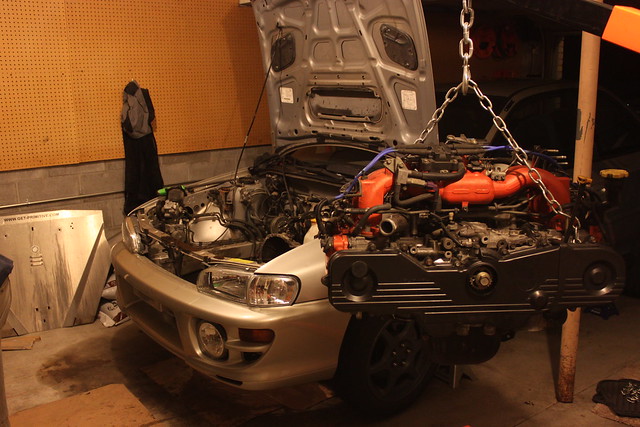 Based on findings from Polk, an automotive data information gathering organization, 96% of all Subaru cars built in the last 12 years are still on the road today. Considering that Subarus undertake a great many tasks outside of daily driving (outdoor recreation, racing, extreme weather conditions) this is quite an impressive finding. In the United Kingdom, Subarus boast a staggering 99.3% of all Subarus still kicking arse in the last 10 years.
Based on findings from Polk, an automotive data information gathering organization, 96% of all Subaru cars built in the last 12 years are still on the road today. Considering that Subarus undertake a great many tasks outside of daily driving (outdoor recreation, racing, extreme weather conditions) this is quite an impressive finding. In the United Kingdom, Subarus boast a staggering 99.3% of all Subarus still kicking arse in the last 10 years.
Consumer Reports recently had a study that found the Subaru Legacy made the list of cars most likely to go over the 200,000 mile mark. They compiled the list from about 30 million vehicles advertised for sale during the year and looked at model years 1981-2010. The Subaru Legacy was at the top of that list. Unsurprisingly, the Legacy's cousin, the Outback wagon, was also on that list.
I've seen the flip-side of this happen with Subaru vehicles, too. When customers that are new to Subaru buy one, they've heard these claims of how reliable and solid these vehicles are. It's a bulletproof car, so why bother with general maintenance? Oops, you missed your Oil Change 30k miles ago... so your engine kinda stopped working. "But I thought Subarus were supposed to be reliable?!?" Yes, but anything that is neglected can and will go wrong. Whether it's a '92 Chevy Lumina or a 2017 Subaru Impreza, you get out what you put in. For the most part, this isn't the case. As with any growing brand, issues start to surface. But many of the knocks I've seen on Subaru vehicle reliability have been less of a manufacturing flaw and more of a neglect issue.
That's not to say Subarus are 100% free of issues. Ask anyone who's had a head gasket go bad in a early 90s Subaru (all the way up to about 2010 or so) and they might grimace a bit at the reliability claims. There was also an issue with Oil Consumption on Subarus from about 2011 to 2014, but most of those issues have been resolved or taken care of by Subaru. No automotive manufacturer can say they've built a "perfect car", but it still seems that Subaru's list of recalls, issues, and nagging problems have been noticeably less common compared to others.
Subaru didn't suddenly become recognized as a Long-Lasting brand overnight. This kind of trust has been built over a long time. Remember those cheap interiors and plain styling I mentioned earlier? Subaru has made a point to focus less on those aesthetic things and more on how the car works. A smooth-running Boxer engine at the core of every Subaru vehicle is a great starting point. In a Subaru Boxer engine, the pistons face opposite each other in a side-to-side symmetrical layout. The opposing pistons work to cancel out the inertia force of each other, resulting in less vibration, superb rotational balance, and a smooth feel when approaching the high rev range. This results in less wear and tear over long periods of time. Add these advantages to an easily-accessible layout under the hood and your labor times go down as well. Repair costs aren't as high when things are simple and easy to get to.
There's another element at work here that has been helping keep Subarus on the road that you might not expect: Safety. Remember that for a longevity study to reflect as strongly as the results that Polk compiled the car still needs to be functioning on the road. While many newer Subarus now have sophisticated collision avoidance systems, the longevity studies predate those. Subarus tend to stick to the road and provide better control than other cars thanks to their All-Wheel Drive system, low center of gravity, and even weight distribution. Mix in the great interior visibility for the driver to see and avoid tricky situations and you've got a recipe for street survival. These components help Subarus stay sure-footed through bad weather and slick conditions.
So really, it started with Subaru making good cars from the get-go. Nothing is perfect, but the "Cheap and Easy Does It" slogan really drives home the idea behind making Subarus. Instead of a lavish interior sprinkled with smartphone tech that will go wrong in a week, they've opted to go the conservative route which has not only made things last longer, but also easier for owners to use. From there, a loyal group of owners kept their vehicles on the road with religious service intervals so they could hand their trusty Subaru down to their Family member, friend, or neighbor. These owners know that their car will take care of whomever they're passing the torch with reliability under the hood and a safe grip to keep them on the road when it's bad outside. It's all a recipe for making a great car with can-do attitude. In a day and age where everyone is trying to make their dollar go further, finding a car that lasts makes a lot of sense.

You ought to be a part of a contest for one of the finest blogs on the internet.
ReplyDeleteI most certainly will recommend this website!